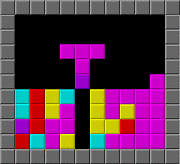|
This is kinda getting away from discussing the politics of the game lines
|
|
|
|

|
| # ? May 25, 2024 02:34 |
|
fool of sound posted:This is kinda getting away from discussing the politics of the game lines The political weirdness mines will run dry eventually. Milo and POTUS posted:What's with the mummies Well I've read (and half remember) Mummy : The Resurrection, which I think is Mummy 2nd edition. It was part of the Year of the Scarab line. Anyone else want to take a crack at it?
|
|
|
|
All I remember about mummies off-hand was that the first attempt at their book gave them at least one hilariously broken ability. Mummies could basically make anything else cease to exist by wanting it.Ferrinus posted:Since all these games are in one way or another about modernity, and therefore about capitalism, they're ultimately different takes on how to survive within capitalism, or how to carve out oases of self-determination within capitalism, or in the most ambitious ones - generally Mage, but sometimes Werewolf and Demon - how to destroy capitalism. If you were going to start talking about Werewolf as anti-capitalism, I honestly don't think you'd do much better than a read-through of Subsidiaries: A Guide to Pentex. There's a lot to chew on there, although the video game chapter in particular is very dated by now.
|
|
|
|
Wanderer posted:All I remember about mummies off-hand was that the first attempt at their book gave them at least one hilariously broken ability. Mummies could basically make anything else cease to exist by wanting it. I want to know all about contemporary opinions of 90s video games as filtered through the lens of a tabletop RPG supplement
|
|
|
|
Milo and POTUS posted:What's with the mummies Return the slab.
|
|
|
|
WoD mummies are Mary Sues who pretty much can't die and are insanely powerful. There's only a small number of them. They're one of the few splats that are good guys. CoD mummies are ancient burglar alarms for a forgotten empire that once dominated a large portion of the human race but now mostly exists through cults. The mummy cults do get involved in politics though from what I understand to remake this empire. CoD mummy is a troupe game too because mummies are really powerful and have no real reason to collaborate amongst themselves like other supernaturals since they don't wake up unless something is taken. This means you're going to be playing a cultist and switch off from time to time who plays the mummy. RocknRollaAyatollah fucked around with this message at 23:56 on Jul 31, 2021 |
|
|
|
One product line's politics that I find fascinating is Hunter: the Reckoning. The result of a couple interesting ideas crashing into the "facts" about the setting, Hunter was released in 1999 as part of the "Year of Reckoning" that saw a bunch of other revised releases, and a big red star appearing in the sky to warn us all about impending doom. Now, before I talk about Hunter's politics and their problems, I need to set some ideas up, so please bear with me. Most fictional stories involve people with agency, people who do things. While there have been some very interesting novels about inaction and stasis (Stoner by John Williams and The Pale King by David Foster Wallace come to mind), the vast majority of fiction involves people who do things, who have their world changed, and who subsequently take some action. Even a play like Hamlet, which features a lot of vacillation on the part of the protagonist as to what he should do, eventually has him take action and then deal with the consequences. Speaking in the broadest of broad strokes, this has meant that fiction typically dealt with elites, with people who had the means and the opportunity to act. Our oldest stories are about Gods and Kings; meditations on the joys of an uneventful life as a peasant farmer were reserved for poetry. This eventually expands to include not just King, Gods, and their offspring, but their more distant offspring, the knights and heroes. Action and choice are reserved for the elite, and the preterite were left to be the NPCs of stories. Thomas Pynchon, Gravity's Rainbow posted:Nobody wanted to hear about all the Preterite, the many God passes over when he chooses a few for salvation. William argued holiness for these "second Sheep," without whom there'd be no elect. You can bet the Elect in Boston were pissed off about that. And it got worse. William felt that what Jesus was for the elect, Judas Iscariot was for the Preterite. Everything in the Creation has its equal and opposite counterpart. How can Jesus be an exception? could we feel for him anything but horror in the face of the unnatural, the extracreational? Well, if he is the son of man, and if what we feel is not horror but love, then we have to love Judas too. Right? How William avoided being burned for heresy, nobody knows. We do better now, with a vast array of stories featuring all sorts of people from all walks of life, but stories still tend towards people with agency: billionaires, geniuses, special soldiers, etc. or at least people who are temporarily experiencing agency: divorcees on vacation to find a new partner, kids in college, a bakery owner who just witnessed a murder and is the only one who can help the local sheriff... Games are no exception to this: very few of us choose to pretend to be ourselves as we exist currently. We choose to be heroic knights and wizards, or powerful scheming vampires, or giant robot pilots, or post-apocalyptic saviors. Part of the fun of a game is doing something you cannot do in real life, be that help the unfortunate and bring about genuine lasting social change or set one's self up as a world controlling dictator with a vast harem. And WoD was no exception. The Vampires, Werewolves, Mages, etc. are the elite of the world. What they did mattered. They were special and powerful and "regular" people stood no chance against them. Not even taking into account roleplaying situations, these characters just have more dice they can roll and more abilities they can access which make them demonstrably more powerful than others. The "mechanics" of the universe set them up as superior. And again, this is fine. It's a fantasy. It's healthy to pretend and get out of one's own head for a while. It's a game and it's meant to be fun. This brings us back around to Hunter. Hunter was about playing a "mere mortal" imbued with divine(?) power in a moment of crisis and given the opportunity to fight back against the forces of darkness that corrupt and descend the world. Perfectly good hook, and something that a lot of people would find very appealing. Finally, a game that will let us punch that smug vampire rear end in a top hat through his face, and let him know that for all his plans and machinations across the centuries, he's no match for someone who is Fed Up and Not Going To Take It Anymore. Unfortunately, the game can't make up its mind, and the writers seem so enamored of all the precious elites they've spent a decade lovingly crafting, that the text is constantly undercutting itself. A Hunter's magic powers don't work at the GM's discretion, depending on the strength of the supernatural entity. A Hunter, mechanically, has no way to access the full suite of combat powers that vampires and werewolves and mages have: no extra actions, no die pool buffs, no innate defense or regeneration. The art shows normal people killing werewolves with spoons and shotgunning vampires into paste, but the words constantly admonish the player against wanting to do all the cool things in the art with that hoary old cliche about not becoming a monster one's self, as if there's some sort of moral equivalence between being, for example, a super-powered sexual predator, and being the person who stops that predator. The game wants you to be cunning and clever, rather than using brute force, but it has no way to support this mechanically. The writers simply cannot help themselves from siding with the elite. They don't want their precious NPCs to be bothered by some common people. They don't want their time and space warping metaplot to be derailed by some weirdos who get magic powers from voices. Those are the important people! Not these jamokes! And this is even in a supplement where those "mortals" are being blessed with supernatural power; the text extols the virtues of collective action on one side, and then turns around and says that the "regular" masses are a bunch of losers, cowards, and impotent fools who will only get in the way. Some parts are written in a heroic "What will you do when you life is ripped away from you and you decide to fight back?" style, but the rest of it answers "Die like a dog, because the monsters are quantitatively better than you". They want to do the Lovecraftian horror of being pulled into an unknown and unfriendly world, but seem to have forgotten the part where Cthulhu gets beaten by ramming a boat into him. The whole game line reminds me of an infamous module for Paranoia, a game about paranoid bureaucracy in an underground bunker. In this story, The Computer, in it's infinite wisdom, has decided to change the food tanks from a circular shape to a square one. This will accommodate a slightly larger amount of food in the same space, and is thus a net good. The Computer has not calculated, however, that the spinning blades in the vat move in a circle, not a square, so the tanks all get gunked up in the corners and have rotten food trapped there, spoiling the entire batch. But Friend Computer is never wrong; it making a mistake is impossible, so the PCs have to deal with their society slowly starving to death regardless of whatever impotent action they take, often being executed by their peers for daring to question The Computer. It's meant to be a slow, sad game about inevitability and failure, with some very black humor thrown in, and the module states that outright at the beginning that there is no way for the PCs to "win". Regardless of their actions, everyone dies because of The Computer's decision. The PCs can only keep prolonging the inevitable. The differences is that Paranoia has a very different tone, and going in, the PCs know that character death will be frequent, brutish, and often funny, in the style of Vonnegut or Heller. Hunter's tone is all over the place, and the system as written doesn't make the PCs able to succeed, or even make much of an impact. There's an idea of a good game here, but the way it's presented both fictionally and mechanically is so antithetical to the proposal that it just doesn't play very well without serious adjustments to the mechanics. As written, it doesn't allow for the agency of the other product lines. It's not very fun, because the very writing in the book often seems to hate the players and hate the idea of them achieving anything. And these days, at that point, why not just play Monster of the Week instead?
|
|
|
|
The talk about the Aztecs and the like actually ties in with some of the other issues in WW as well. oWerewolf has two Native American tribes (used to be three with the Croatoan but they got killed off) called the Uktena and Wendigo. The fact that they're both named after harmful spirits is bad enough - with the Wendigo being particularly troublesome - but they're presented in the write ups as living harmoniously with their kin before the encroachment of Europeans and their whole pillaging the world around them by building cities and farms and poo poo. Which completely ignores the very real large scale earthworks and agriculture works that native populations constructed. But for some reason their treatment of Mesoamerican culture's always stuck in my craw, possibly due to my peninsulares/criollo heritage on one side of the family. As mentioned the Aztecs were literally controlled by a bloodthirsty demon-worshipping vampire which falls in pretty well with popculture takes on them... a popculture take built around both the Spanish and the various vassal states of the Aztecs playing up certain aspects of their empire to justify what happened to them. The whole "holy poo poo these people have massive waterworks and are able to keep a massive city way more sanitary than what we can" thing that the Spaniards were awe-struck by is ignored. Even the various flower wars that the Aztecs waged were as much about keeping their vassal states under control as gaining sacrifices; for the life of me I can't see the big difference between those actions and what the Romans did to keep their empire. That's not even getting in to how Latino/Hispanic culture still continues to be displayed in media elsewhere. I've got an effort-post floating around in my head about both machismo and caballerosidad somewhere but i lack the cultural understanding and research chops to do it actual justice. *edit* And the post above mine made me think of the Bone Gnawers, aka The Best Werewolf Tribe. So much of that game line is about worrying blood purity concerns, battles for supremacy and dominance (using outdated understandings of how wolf packs work), and the like. And then you have a whole group of the rejects of that society. They're mostly treated as a joke in the setting - literal werewolf bums and hobos that are looked down on and mocked because they aren't out there being Elite Bad Asses and because wolves have to have an omega, right? The sheer fact that you are playing one as a PC puts your character in the top 10% of them because the other 90% can't be arsed to take part in most things and are presented as lazing about mooching for free food. Up until something actually no joke Needs To Be Done and suddenly you have a dozen random hobos showing up and throwing themselves in to the fray. In a post-Occupy world these things read radically different. citybeatnik fucked around with this message at 16:32 on Aug 1, 2021 |
|
|
|
Oh yeah, see also "the practice of the Aztec folk religion is literally hastening the apocalypse and a dragon left a substantial bounty for the capture of their priests" in Shadowrun. The animal-sacrifice-as-demon-worship Christian attitude is depressingly common in fantasy writing, despite most world religions practicing it to a greater or lesser extent.
|
|
|
|
fool of sound posted:Oh yeah, see also "the practice of the Aztec folk religion is literally hastening the apocalypse and a dragon left a substantial bounty for the capture of their priests" in Shadowrun. The animal-sacrifice-as-demon-worship Christian attitude is depressingly common in fantasy writing, despite most world religions practicing it to a greater or lesser extent. Yeah. There's even a line in the Cult of Ecstacy book about how Mayan blood sacrifices were totally fine but gently caress the Aztecs. Granted that whole Tradition can be stupid as gently caress - drugs are good, sex is great, free your mind! Also sometimes you need to sneak some pot in your unwilling friend's brownies to expand their conciousness! It's because of poo poo like that which causes me to side with their Schismatics - the Anghori (based off the actual Shivan worshipers), the Hagalaz (which are based off of the very troubling Norse idealization you find in death metal), and the Acharne (Fight Club meets Eyes Wide Shut). But then you have poo poo in the same gameline with the Etherites - the group mostly seen as "steampunk for the sake of it" - having urban planners pushing for some very Leftist views, folks attempting to hack the very concept of Capital to undo it, and a massive groundswell of folks pushing for a more inclusive take in academia because surprisingly when you have POC and LGBT voices in things you learn new things. Another example of the unfortunate parts of the gameline is how it treats majority-minority cities in Vampire. The "evil for the sake of evil" vampire faction (as opposed to "evil because gently caress You Got Mine") is coded as being more active/secure in US cities where you have high African American or Latino populations. To the point where it's when lampshaded in one of the books when a young vampire runs a statistical analysis and proves that these disenfranchised groups are prime recruiting grounds and that if maybe things were made a little better for them then maybe it'll be a much better for everyone. The powers that be carefully read over this report, nodded their heads solemnly, and all agreed to double down on racism and disenfranchising these groups to make it just a little bit harder for their rivals to make use of them. Because it's better for their bottom line. If that doesn't sum up American politics i don't know what does.
|
|
|
|
Fuschia tude posted:I want to know all about contemporary opinions of 90s video games as filtered through the lens of a tabletop RPG supplement My copy's still in storage. If anyone else has one, they're welcome to chime in. One thing I remembered by glancing at the Fandom wiki was that Tellus, the evil video game developer, is depicted as a crunch-culture powerhouse that releases flimsy, inexpensive products (so they produce more e-waste) and is running a deliberately addictive MMORPG that has rudimentary 2000-era VR capability. People have died or ruined their lives due to playing it, which is of course the point; there are a lot of things in the Pentex sourcebook that aren't necessarily meant as Big Evil Plans, but are just things that could eventually be part of the groundwork for one, or which just make life on Earth that little bit worse for everyone. Tellus is a fairly blatant stand-in for 2000-era Electronic Arts, created four years before the ea_spouse event, so this one got called in the air. That, in turn, suggests that the MMORPG in question is meant to be reskinned Ultima Online. What's a little weird in retrospect is that the fictional MMO, Eden Online, is about settlers searching the galaxy for other habitable worlds after Earth's environment has been destroyed. Not only does the quick-and-dirty description of the game sound quite a bit like the background lore for EA's later series Dead Space, where humanity roams around the galaxy cracking planets open like walnuts, but it also sounds more than a little like EVE Online, the owners of which bought White Wolf outright in 2006.
|
|
|
|
Have we talked about the Cainite Heresy yet? Because the Cainite Heresy is basically vampire hunter QAnon, they are presented as protagonists within their own gameline, and the more I think about it the more hosed up and problematic it is
|
|
|
|
Magic is a tabletop card game https://twitter.com/TeaFeck/status/1421925450742444035?s=19
|
|
|
|
Froghammer posted:Have we talked about the Cainite Heresy yet? Because the Cainite Heresy is basically vampire hunter QAnon, they are presented as protagonists within their own gameline, and the more I think about it the more hosed up and problematic it is I thought it was more "We are waiting fur the vampire antichrist to rapture us. Also Jesus was a vampire"? Or was it the taking over of the Catholic church part?
|
|
|
|
Shrecknet posted:Magic is a tabletop card game The early editions of Magic used to have quotes from literature as the flavour text, not just from characters in the setting. 
|
|
|
|
Dienes posted:I thought it was more "We are waiting fur the vampire antichrist to rapture us. Also Jesus was a vampire"? Or was it the taking over of the Catholic church part? They're talking about the nWoD Cainite Heresy, from Hunter: the Vigil/Requiem for Rome.
|
|
|
I do want to follow fool of sounds’ interest in opening this thread up to other traditional gaming media, so I thought I’d write on one of boardgaming’s recent critical darlings, ROOT. Root is an asymmetric strategy game where you take control of radically different factions of woodland critters in order to rule the dozen communities that dot the forest. It’s very much Risk-meets-Redwall, but the presentation makes it look like this is a jolly romp in the Hundred Acre Wood. Adorable wooden pieces peek at you from across the table while vibrant colors and charming animals appear on all the cards. This is a filthy lie, designed to trick your family into playing a deeply political and opinionated war game.  (Cole Werhle, designer, “A Defense of Kingmaking”) Root was initially inspired by an audiobook version of T.H. White’s “The Sword in the Stone”, specifically the droning speech of the Monarch of the Moat: quote:”There is nothing,” said the Monarch, “except the power which you pretend to seek: power to grind and power to digest, power to seek and power to find, power to await and power to claim, all power and pitilessness springing from the nape of the neck... Root attempts to follow on from “The Sword in the Stone” by being a political Aesop, using the medium of cute animals to express opinions of power and how it is wielded. The game’s pieces are a lowest common denominator of politics. You have: Victory Points, a measure of how legitimate your faction has been (first to 30 wins) Warriors that represent critters that are willing to fight Buildings and Tokens that represent a faction’s interests And a hand of Cards that represent locals you can use in your cause. In all, Root has a rather bleak view of politics, where legitimacy can always be gained through violence (destroying buildings and tokens gives you points), and for most factions violence is completely unavoidable. Might makes Right, after all.  I’ve been tapping at this post for a bit in my downtime so I’ll limit the scope of the first entry on the Marquise De Cat, just so I can have something to spark some discussion. The Marquise is central to the “lore” of the game, though you can set up the board without her units. As a cat she is an invasive species, and she has just recently conquered the forest. As a representation of an imperial state, she starts out with weak control of every space on the board. Root argues that an Empire gains legitimacy by building infrastructure, so the Marquise gets points by building buildings. To that end the Marquise needs lumber from chopping down the forest, and has to rabidly protect that lumber from other factions since it represents a ton of points if your opponents demolish your lumber camps. If Root has anything good to say about empires it’s that they are focused on employing as many people as possible, with the caveat that you’re literally “Overworking” people by discarding their cards to create more wood, consuming them the way you do lumber. It’s all about resource extraction, and people are a resource. At least the army gets healthcare… There’s a lot more to each of the factions, and I want to go over the Woodland Alliance and their popular revolution next.
|
|
|
|
|
Yeah the marquis is explicitly a colonial power focused on industrializion and resource extraction. Because she starts with control of the board, and because she has poor action economy, she effectively wants to have an intentional controlled collapse and consolidate her industrial power until she's unassailable. There's another imperialist faction in the moles, more interested in making the woodlands a tributary than on raw materials. They're focused on building military outposts and friendly markets rather than the cats' sawmills and workshops; old world imperialism rather than colonialism.
|
|
|
|
Huh, I had always read the Underground Duchy of the moles as a more explicit parody of American intervionism, with tunnels=airports and an allergy to responsibility when things went bad with the “Price of Failure” rule.
|
|
|
|
|
RocknRollaAyatollah posted:WoD mummies are Mary Sues who pretty much can't die and are insanely powerful. There's only a small number of them. They're one of the few splats that are good guys. Fun fact, in Mummy: The Curse, a mummy's supernatural resource (Sekhem) is actually scientifically measurable, and since it's usually attached to artifacts rather than the mummies themselves, it's useable by humans. There's an antagonistic mega-corporation called Last Dynasty Incorporated, and their entire goal is to get their hands on all of the magical artifacts they can... So they can cure cancer and AIDS and extend lifespans, but only for people who give them lots of money. It's interesting to see the shift from corporate antagonists being cartoonish Captain Planet-esque megapolluters in Werewolf, to Mummy where it's essentially a slight exaggeration of the pharmaceutical industry.
|
|
|
|
Triskelli posted:Huh, I had always read the Underground Duchy of the moles as a more explicit parody of American intervionism, with tunnels=airports and an allergy to responsibility when things went bad with the “Price of Failure” rule. That's also a valid reading I hadn't really thought about. I can definitely see it: their homeland is unassailable, they're hesitant to invest heavily in the conflict at first until they get public opinion on their side through some early victories, and they're quick to cut and run in the face of setbacks, but if they get momentum behind them they can bring a level of force and logistics to bear that few other factions can match.
|
|
|
|
Right I got Root on steam, but barely played it. I should play it more.
|
|
|
MonsieurChoc posted:Right I got Root on steam, but barely played it. I should play it more. The first expansion is available, with the Lizard Cult, the Riverfolk Company, and three new vagabonds.
|
|
|
|
|
My Animal Farm gaming is limited to Armello, looks like I have another one to pick up. (Armello is mostly just Game of Thrones-tier politics in terms of complexity, or lack thereof).
|
|
|
Sodomy Hussein posted:My Animal Farm gaming is limited to Armello, looks like I have another one to pick up. You’d most easily slip into the role of the Vagabond, who plays an RPG while everyone else is playing Risk.  (Beat up the beaver at every opportunity, or this WILL happen). There’s not much in the way of political commentary going on with the Vagabond, whichever class you pick is going to be an individual puttering around the forest scoring a few points here and there until you’re strong enough to go on a muderhobo rampage. Your strength is determined by the number of Items you have such as boots and swords, which exist in ruins and can be created by you or the other players for a VP reward. If someone makes an item you can wander over to their territory and forcibly take the item by giving them a card. This improves your relationship with the common folk of that faction, and eventually you can get chummy enough that you can move an opponent’s soldiers with you when you move! The most incisive commentary in the vagabonds’ design is that other people can only really interact with you (an individual) with violence. Anything they do that helps you out is usually incidental (and smart players will do everything in their power to slow you down) 
|
|
|
|
|
Yeah the solution to the vagabond is for all other players to violently oppress them because they are an ubermensch who will conquer the forest by sheer force of bootstraps otherwise. That's not the INTENTED message; vagabond is supposed to be an opportunist who wins by becoming a folk hero while all the other factions ruin the forest duking it out for too long, but they got the balance wrong.
|
|
|
|
Triskelli posted:You’d most easily slip into the role of the Vagabond, who plays an RPG while everyone else is playing Risk. I'm not saying that I'm allergic to sociopolitical gaming, just that Armello to my reading is fairly simple as far as messaging.
|
|
|
|
Anyone here able to talk about the politics of the RPG Lancer? I’ve heard mention here and there that it has Strong Opinions On Politics and while they don’t sound suuuuper nuanced I’d be interested to read the take of someone who’s been able to delve into it. Weird lore digressions into their concept of AI also very welcome if it fits into the political discussion angle of the thread.
|
|
|
|
Kestral posted:Anyone here able to talk about the politics of the RPG Lancer? I’ve heard mention here and there that it has Strong Opinions On Politics and while they don’t sound suuuuper nuanced I’d be interested to read the take of someone who’s been able to delve into it. Weird lore digressions into their concept of AI also very welcome if it fits into the political discussion angle of the thread. Pretty sure one of the devs is a goon, I keep forgetting who, though.
|
|
|
|
Absurd Alhazred posted:Pretty sure one of the devs is a goon, I keep forgetting who, though. Yep, he posts in the Kill Six Billion Demons thread from time to time! Dude is very, very busy so I doubt we’ll hear from him, but it’d be interesting to see what he has to say on the topic.
|
|
|
|
Absurd Alhazred posted:Pretty sure one of the devs is a goon, I keep forgetting who, though. Operant, who is the author of cool webcomic Kill Six Billion Demons.
|
|
|
Sodomy Hussein posted:I'm not saying that I'm allergic to sociopolitical gaming, just that Armello to my reading is fairly simple as far as messaging. Oh! Oh I didn’t mean that, just that like Armarello, the Vagabond is all about questing and leveling up. Though those methods of point scoring are less efficient than murder about halfway through.
|
|
|
|
|
I cometely forgot that Kill Six Billion Demons existed due to real life eating me alive for a while but not only has this thread reminded me that it exists i find out that it's a goon project. Gonna have to catch back up. And i welcome any weird-lore-turning-into-politics discussion.
|
|
|
|
Well since the board game seal has been broken I'm going to make an effort post about colonialism in board games later, probably ending at Archipelago, designed by Christophe Boelinger. That game has a literal track for measuring the unrest of the natives (represented with a black meeple) and the overseeing power of the settlers (represented by a white meeple) and if the unrest ever catches up to the overseeing power, the natives rise up and everyone looses. But while I'm working on that, can anyone speak on the politics of Palladiums's Rifts? I only have vague memories from decades ago of a fascist military America and a bajillion splat books. Oh and an almost unplayable system, but that's beyond the scope of this thread. I have to assume there is some juicy stuff that I don't remember/didn't recognize at the time.
|
|
|
|
SporkChan posted:Well since the board game seal has been broken I'm going to make an effort post about colonialism in board games later, probably ending at Archipelago, designed by Christophe Boelinger. That game has a literal track for measuring the unrest of the natives (represented with a black meeple) and the overseeing power of the settlers (represented by a white meeple) and if the unrest ever catches up to the overseeing power, the natives rise up and everyone looses. This seems like a nice write-up about Rifts: Africa, which is as bad as you'd imagine.
|
|
|
|
Hoo boy, Archipelago is an electrifying mess of a game. It’s Catan redesigned by an adderall addict. But it’s hard to hate because despite its obvious shortcomings because at the very least the designer has done some introspection into how colonization impacts the people colonized, and the game forces the players to consider the island chain’s needs or everyone can lose outright. Archipelago forms a nice counterpoint to Spirit Island, which is just as bright and colorful with a near identical setting, but instead you play an island spirit that is driving the settlers back into the ocean.
|
|
|
|
|
Picked up Root on steam thanks to this thread.
|
|
|
|
|
I want to talk a bit about the roleplaying game Delta Green. The elevator pitch is that the players are a group of disparate cops and feds brought together by a government conspiracy to investigate, stop, and cover up Lovecraftian incursions into the world. From a gameplay standpoint, the setting is meant to give an excuse for the player characters to actually continue investigating things rather than rightfully going “nope” and leaving. It also pushes for every character to have baseline competencies in relevant skills; all the cops and feds have some combat and investigation ability. Among the federal agencies you can play as, there is a pretty extensive writeup of ICE. You can play as the FBI, CIA, or regular cops, all of which have a primary in-game goal of hiding their actions from the public. In real life, of course, these agencies do tons of horrific things, with some like ICE being more subject to major public backlash. So you’ve got agencies associated with often bigoted or monstrous actions as the source for the protagonists. Most people know that the H.P. Lovecraft horror that this game uses comes from a writer who was personally very xenophobic and racist, and who incorporated these themes directly into his work. A big them in Lovecraft’s work is the idea of “things man was not meant to know” and how knowledge of them drives men literally insane. One of the other bit gameplay elements of Delta Green is the idea of a home life. Like many RPGs, Delta Green has a “sanity score” reflecting how resistant a character is to being driven mad by awful experiences. Losing enough sanity points leads to disorders based on real world ones. Delta Green diverges from many other RPGs by having a group of Bonds whom the agents can project sanity loss onto, leading to home scenes later where the character plays out the deteriorating relationships. I don’t know the exact math for how it balances out, but rules to try fixing those relationships lead doing that rather than trying to regain sanity points, and spending time to regain sanity points results in those relationships deteriorating further. Basically, there’s a guaranteed downward spiral the longer a character is played. So what is the mindset of this game? To me, it seems that this is a game about playing the worst kind of “ends justify the means” feds and cops who live in a world where that is factually true. There absolutely are dark monsters from other countries, ideological viruses that need to be purged, and a constant need to be vigilant and ready to kill. This world they see is an abhorrent one to live in, and over time they become less and less able to cope with it. There are some members of the conspiracy who believe they understood the evil and how to utilize and contain it, and this keeps them sane. But it’s ultimately a lie, and one that they would come to realize by actually playing one of the delta green missions. Do the creators of this game intend this level of satire of “deep state” mindset, either at its most bloodthirsty or at its most neoliberal “humanitarian?” It’s hard to say. Their personal politics seem to lean a bit more toward the latter, albeit not hyper-interventionist. More of the “there is some greater threat to our society and culture we need to defend against, but we need to do it in a smart way,” kind of mindset. The irony is of course that the game basically trashes this kind of thinking. There is no “smart” way, except for one of the community’s favorite kind of missions: things would have resolved themselves in a much less messy way if delta green had never gotten involved. Hmm.
|
|
|
|
fr0id posted:I want to talk a bit about the roleplaying game Delta Green. The elevator pitch is that the players are a group of disparate cops and feds brought together by a government conspiracy to investigate, stop, and cover up Lovecraftian incursions into the world. From a gameplay standpoint, the setting is meant to give an excuse for the player characters to actually continue investigating things rather than rightfully going “nope” and leaving. It also pushes for every character to have baseline competencies in relevant skills; all the cops and feds have some combat and investigation ability. One of the designers is a "Nixon was right to bomb Cambodgia" Republican. Kenneth Hite. Funnily enough he was in charge of Fall of Delta Green, the 60s version, and it does not shy away from the horrors perpretated by America.
|
|
|
|

|
| # ? May 25, 2024 02:34 |
|
fr0id posted:I want to talk a bit about the roleplaying game Delta Green. The elevator pitch is that the players are a group of disparate cops and feds brought together by a government conspiracy to investigate, stop, and cover up Lovecraftian incursions into the world. From a gameplay standpoint, the setting is meant to give an excuse for the player characters to actually continue investigating things rather than rightfully going “nope” and leaving. It also pushes for every character to have baseline competencies in relevant skills; all the cops and feds have some combat and investigation ability. While I'm admittedly not as steeped in lore as some others here, what I took from Hunter: The Reckoning was something in the general ballpark: the various monsters control the world, and people either rationalize what's going on or they literally can't see the bad stuff happening due to glamours or whatever other supernatural stuff is going on. Your office where you work might be mostly full of the living dead but to you, a regular person, it might just feel that your coworkers are all just boring sports-bros or whatever. So when whatever straw that narratively breaks the camel's back happens, and you are either Imbued or become a Bystander (the difference being, a Bystander rejects the Messengers' exhortations to DO SOMETHING and retains the ability to see through whatever supernatural veil is over everyone else's eyes, while an Imbued takes the power offered by the Messengers and uses it) your character can see reality as it actually exists. To literally everyone else who isn't some kind of supernatural, it looks like they have a psychotic break and they are often seen (or presented as, by the supernaturally-controlled mass media) as a mass murderer or serial killer to the general public. So there's a similar theme of making sure that the general public remains unaware of the necessary(?) things your characters are doing (because you will be seen as an insane person by literally everyone else) only they usually have far, far less support than a formal organization and are likely to fail given the opposition, unless... I've never really read any White Wolf stuff beyond the core HtR book (though I played Bloodlines and the three Hunter video games, and the wiki is another story all together) but that was the impression that I got from the core book.
|
|
|









































